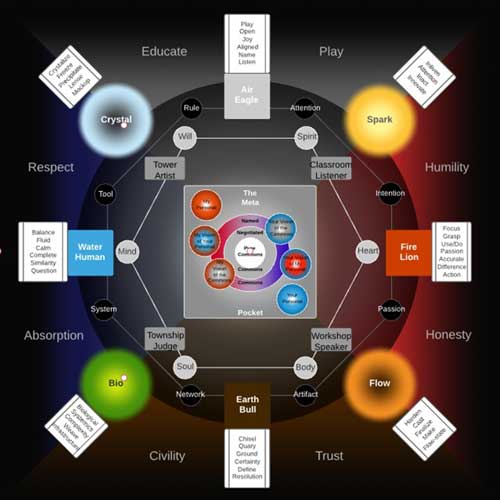A platform co-op community for design, shared learning and practice in service of global mind shift
We are designers, writers, producers, artists, scholars and concerned citizens - working in small, intimate groups - doing just that. We are not waiting for authorities or celebrities to tell us how to change. We learn from experts in psychology, philosophy and religion, and from each other. We welcome new members with ideas to share and a desire to learn.

Reed Rickmers has studied phenomenology from the perspective of embodied cognition and created a symbolic architecture to share his learning.
Born with a congenital nerve disorder that affects muscle control, Reed learned to understand and use that architecture to help reprogram his mind-body coordination so he can now walk more easily. It wasn’t such a giant leap from there to questioning and re-engineering other brain processes, especially those causing less obvious challenges in his life, like addiction.

Fresh out of game design school, it only took a couple of years for James Harris to decide that he didn’t like the game that is the video game business. He could see that, as in Las Vegas or Monte Carlo, the house always wins. Players are mere pawns. And game producers, with a greedy eye on the bottom line, know all the psychological tricks required to hook their customers on obsessive game play as surely as any cocaine addict.

People and groups are coming together in communities to address the wicked problems of the climate crisis, endless wars, political polarization, health challenges, inequality, weaponized communication and so on. To understand what Matthew is trying to do with his Betterment Project, we need to first understand the higher level aspiration of what our group and many other groups are trying to do in addressing the global crises threatening humanity.

While some people think they can read a face or tell what someone is thinking just by looking at them, it’s hardly scientific. trustworthy or even useful. In real life, there’s not much we can do about that. But in video, it’s a scandal that we’re still relying solely on inference and narration to communicate ideas about what is on someone’s mind. A whole new world of visual storytelling would be open to producers if they had a way to share ideas about thoughts, feelings and ideas that doesn’t depend on a lot of narrative exposition.